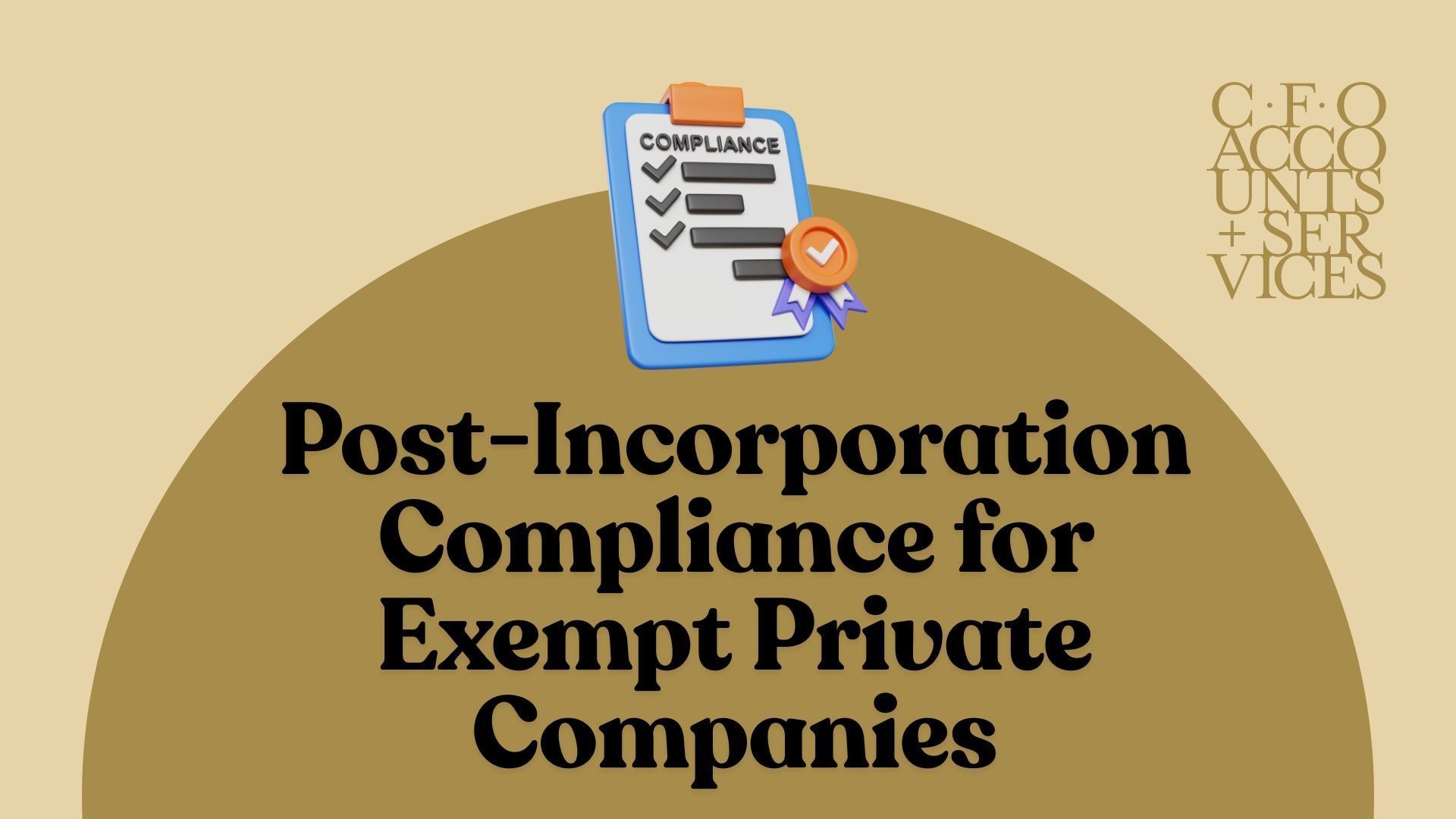CFO GROUP INTEGRATED SERVICES
[EPC Guide] Exempt Private Company Limited by Shares in Singapore
CFO Group • April 29, 2025
An Exempt Private Company Limited by Shares (EPC) in Singapore is a type of business structure designed for small companies with fewer than 20 individual shareholders and no corporate shareholders. This setup offers significant benefits such as limited liability, tax exemptions, and simplified compliance requirements. In this guide, we’ll explore what an EPC is, the advantages it offers, and how you can set one up.
What is an Exempt Private Company Limited by Shares?
An Exempt Private Company Limited by Shares (EPC) in Singapore is a business entity that operates under specific regulations set by the Accounting and Corporate Regulatory Authority (ACRA). Designed for small businesses, EPCs are a subtype of private companies limited by shares, where the number of individual shareholders is capped at 20. This structure ensures that the company’s ownership remains tightly controlled and manageable.
One of the defining characteristics of an EPC is its restriction on corporate shareholders. Unlike other limited liability companies, EPCs cannot have corporate shareholders, ensuring that only individuals hold shares. This distinction not only simplifies the ownership structure but also aligns the interests of the shareholders closely with the company’s operational goals. Additionally, the primary difference between an EPC and a Non-Exempt Private Company lies in the number of shareholders; Non-Exempt Private Companies can have more than 20 shareholders.
| EPC | EPC | |
|---|---|---|
| Max Shareholders | 20 individuals | Up to 50 shareholders |
| Corporate Shareholders Allowed? | ❌ No | ✅ Yes |
| Tax Benefits | ✅ Yes (Startup Tax Exemption) | ✅ Varies |
| Audit Exemption | ✅ Easier to qualify | ❌ More strict |
| Regulatory Burden | ✅ Lower | ❌ Higher |
The most compelling feature of an EPC is its provision for limited liability, which separates the company’s debts and obligations from the personal assets of its shareholders. This means that the shareholders’ liability is limited to their investment in the company, offering a significant layer of financial protection.
It’s no wonder that EPCs are the most prevalent type of company in Singapore, favored for their flexibility and simpler regulatory requirements.
Key Benefits of an Exempt Private Company Limited by Shares
Setting up an Exempt Private Company Limited by Shares (exempt private company EPC) offers significant benefits: limited liability, tax exemptions, and simplified compliance. These advantages create a business environment that is financially advantageous and easier to manage for private limited company exempt private limited companies.
Limited Liability
One of the hallmarks of an EPC is the limited liability protection it offers. Shareholders are shielded from personal liability for the company’s debts beyond their investment in shares. Their personal assets remain safe, even if the company faces financial difficulties.
Separating personal and business assets is a critical feature of the EPC business structure and business structures, providing peace of mind for business owners as a separate legal entity.
Tax Exemptions
EPCs benefit significantly from various tax exemptions, particularly the Start-Up Tax Exemption Scheme. This scheme provides substantial tax relief during the initial years of the company, thereby reducing overall tax liabilities and enhancing financial viability.
These tax benefits can be a game-changer for new businesses, allowing them to reinvest more of their earnings into growth and development.
Simplified Compliance
Simplified compliance is another major advantage of EPCs. These companies are subject to fewer regulatory obligations, such as reduced requirements for audits and financial reporting. This alleviates the administrative burden on business owners, allowing them to focus more on their core operations and less on navigating complex regulatory landscapes.
Requirements for Registering an Exempt Private Company Limited by Shares
✅ EPC Setup Checklist at a Glance
Want a quick overview before diving into the details? Here's what you need to register an Exempt Private Company in Singapore:
✅ At least 1 individual shareholder (no corporate shareholders)
✅ Paid-up capital of at least S$1
✅ At least 1 local director (can be via nominee director)
✅ A registered office address in Singapore
✅ Appoint a company secretary within 6 months of incorporation
✅ Reserve a unique company name with ACRA
To successfully register a Singapore exempt private company limited by shares in Singapore, several key requirements must be met. These include having at least one individual shareholder, a minimum paid-up capital of S$1, and a unique company name.
Additionally, the company must have a physical registered office address in Singapore and appoint a company secretary within six months of incorporation, in accordance with Singapore law. This is a requirement for many companies in Singapore.
Shareholders
Transparency in director remuneration is a cornerstone of good corporate governance. In Singapore, companies must include annual remuneration reports in their annual reports to inform shareholders about the remuneration and benefits for directors and key management personnel. This fosters trust and ensures that remuneration practices are aligned with shareholder expectations.
Directors
An EPC must have at least one director who is a local resident of Singapore. This requirement is crucial for compliance with local regulations and can be managed effectively by hiring professional firms that offer nominee director services.
Paid-up Capital
The minimum paid-up capital for an EPC is set at S$1. While this amount is minimal, it provides the flexibility for the company to increase its share capital as needed based on its financial plans and requirements, including the minimum capital.
Registered Office Address
A physical Singapore office address in Singapore is mandatory for an EPC. This address must be a real, operational location that is accessible to the public, ensuring that the company complies with local regulations and maintains transparency.
Company Secretary
An EPC must appoint a company secretary who is a permanent resident of local companies within six months of incorporation.
The company secretary ensures the company adheres to its statutory obligations.
Step-by-Step Process to Incorporate an Exempt Private Company Limited by Shares
Incorporating an EPC in Singapore involves reserving a company name, filing the necessary incorporation process documents, and obtaining approval along with the issuance of a Unique Entity Number (UEN).
Reserving a Company Name
Choosing and reserving a unique company name is the first step. The name must be substantially different from existing ones and should not contain inappropriate words or infringe on trademarks.
The reservation process is quick and can be completed in just a few minutes.
Filing Incorporation Documents
Filing all the necessary documents is a critical step in the registration process. The two primary documents required are the Memorandum of Association (MOA) and the Articles of Association (AOA). These documents must include details on share allocation, particulars of directors, and company officers.
Approval and Issuance of Unique Entity Number (UEN)
After submitting the incorporation documents, the registrar verifies the application. Upon approval, ACRA sends an email confirming the approval and the allocation of the Unique Entity Number (UEN) to the company.
The UEN serves as the company’s unique identifier for all official transactions.
Post-Incorporation Compliance for Exempt Private Companies
After incorporation, EPCs must adhere to specific ongoing compliance requirements. These include holding Annual General Meetings (AGM), filing annual returns, and appointing auditors if necessary, including annual audits.
As we navigate the complexities of director remuneration, it is essential to stay informed and proactive in managing these critical aspects of corporate governance. By doing so, we can ensure that companies remain competitive and well-governed, benefiting all stakeholders involved.
Holding Annual General Meetings (AGM)
EPCs must hold an annual general meeting within six months of the end of their financial year unless all members agree to bypass it by passing written resolutions. This meeting reviews the company’s performance and makes key decisions for the upcoming year.
Filing Annual Returns
Filing annual returns is mandatory for EPCs. Solvent EPCs are not required to submit financial statements, simplifying the process of simplified annual returns filing. Insolvent EPCs, however, must file financial statements in XBRL format to comply with regulations and provide a solvency declaration.
Appointing Auditors
EPCs qualifying as small companies are not obligated to appoint auditors within three months of incorporation. A ‘small company’ must meet two out of three criteria related to revenue, total assets, and the number of employees for audit exemptions.
Common Challenges and Solutions for EPCs
EPCs qualifying as small companies are not obligated to appoint auditors within three months of incorporation. A ‘small company’ must meet two out of three criteria related to revenue, total assets, and the number of employees for audit exemptions.
To overcome these challenges, EPCs can enhance their financial management practices and seek professional advice to stay compliant and optimize their operations. Engaging professional services can also provide valuable support in navigating the regulatory landscape and securing necessary funding.
How Professional Services Can Assist in Setting Up an EPC
Professional services play a crucial role in facilitating the setup and compliance of EPCs. These firms offer tailored service packages that accommodate the specific needs of entrepreneurs, ensuring that all regulatory requirements are met.
At CFO Accounts & Services, we specialise in helping entrepreneurs set up Exempt Private Companies in Singapore — from incorporation and nominee directorship to accounting and tax filing. Our tailored service packages ensure a smooth, compliant, and worry-free start to your business journey.
👉 Ready to register your EPC? Contact CFO Accounts & Services for expert help today.
Engaging professional services typically involves an inquiry, discussion with professionals, service package suggestion, order creation, payment, and process initiation, with business owners primarily involved in this structured approach. This ensures all necessary steps are followed meticulously, allowing business owners to focus on their core operations.
Summary
In summary, setting up an Exempt Private Company Limited by Shares in Singapore offers numerous advantages, including limited liability, tax exemptions, and simplified compliance. By understanding the requirements and following the step-by-step incorporation process, entrepreneurs can establish a robust business structure.
Setting up an EPC is easier when you have the right partner. At CFO Accounts & Services, we guide you from name reservation to post-incorporation compliance, ensuring every step is done right.
✅ Start your business with peace of mind. Book a free consultation with our incorporation experts today.
Frequently Asked Questions
What is an Exempt Private Company Limited by Shares?
An Exempt Private Company Limited by Shares (EPC) is a business entity in Singapore specifically structured for small businesses, featuring a maximum of 20 individual shareholders and prohibiting corporate shareholders. This structure supports the needs of smaller enterprises while maintaining regulatory simplicity.
What are the main benefits of an EPC?
The main benefits of an EPC include limited liability protection, tax exemptions, and simplified compliance requirements, making it an advantageous structure for many businesses.
What are the requirements for registering an EPC?
To register an EPC, you must have at least one individual shareholder, a minimum paid-up capital of S$1, a unique company name, a physical registered office address, and appoint a company secretary within six months. These are essential steps to ensure compliance with regulatory standards.
What is the process to incorporate an EPC?
To incorporate an EPC, you must reserve a company name, file the necessary incorporation documents, and obtain approval along with a Unique Entity Number (UEN). Following these steps will ensure a smooth incorporation process.
How can professional services assist in setting up an EPC?
Professional services are essential in setting up an EPC as they ensure compliance with regulatory requirements, manage necessary documentation, and offer tailored solutions to address specific needs. Engaging these services can facilitate a smoother establishment process for your EPC.












